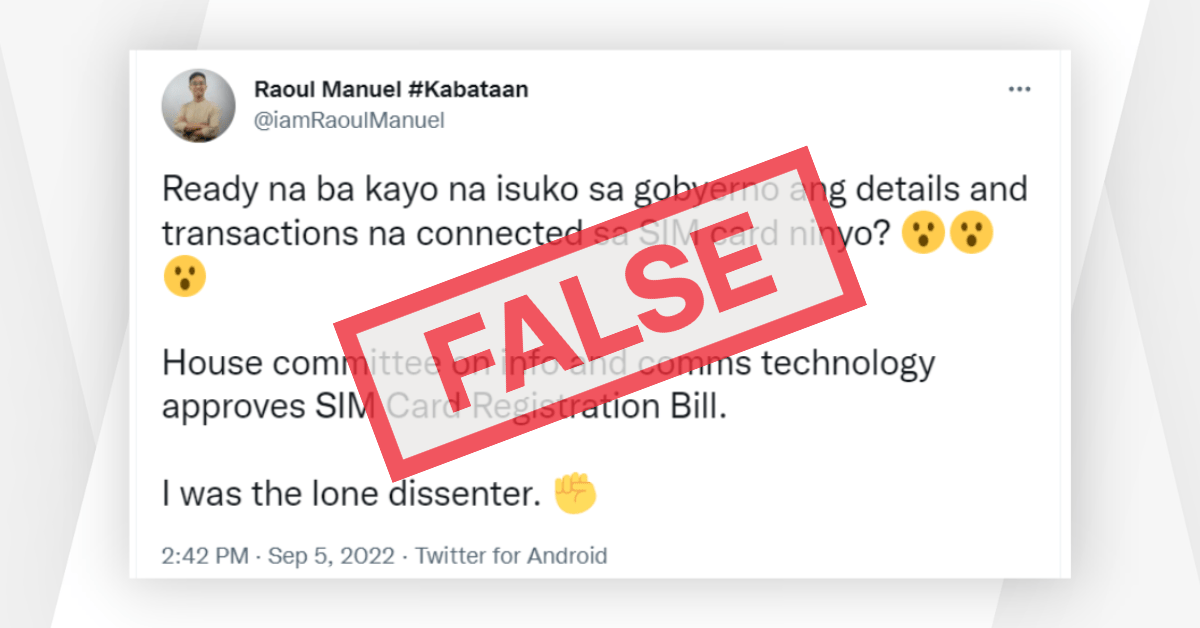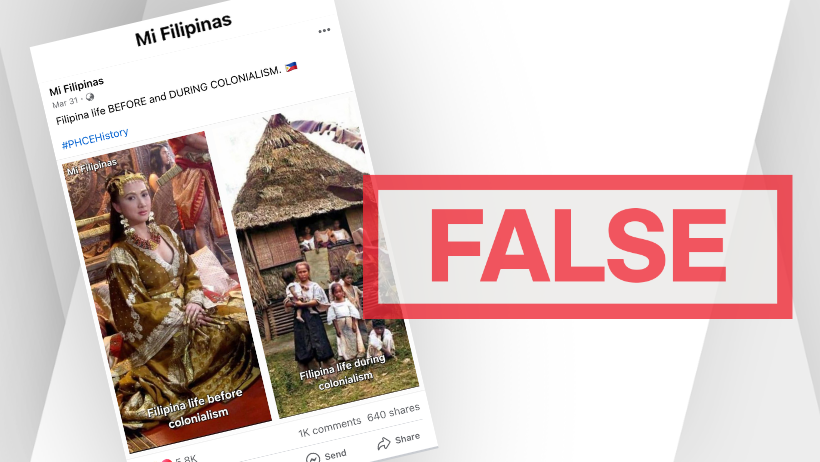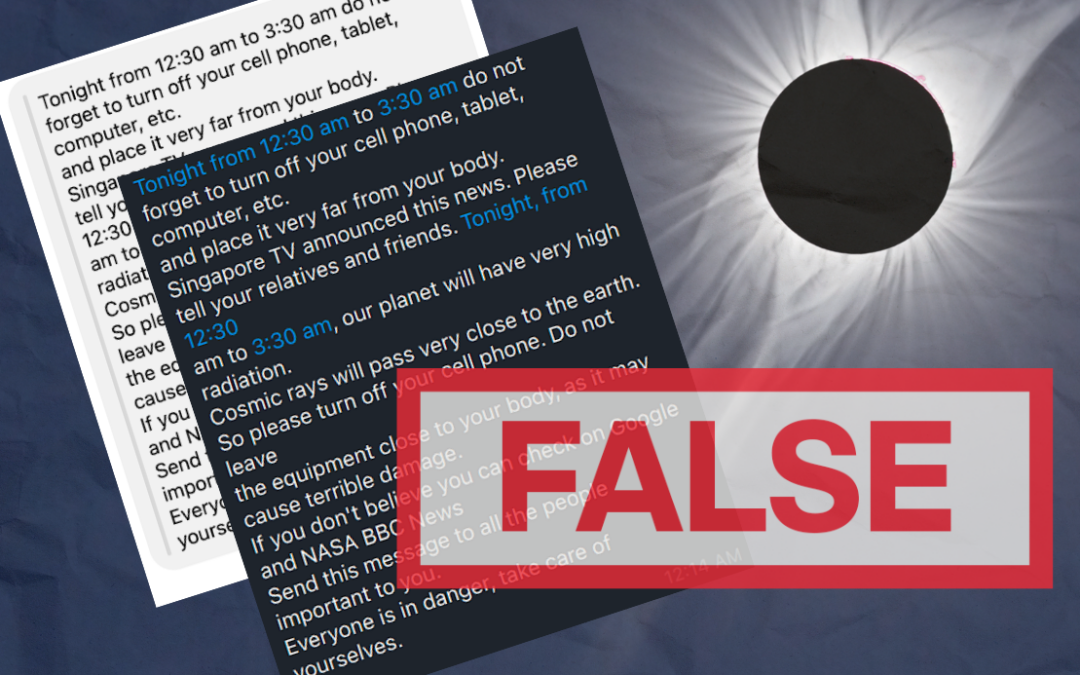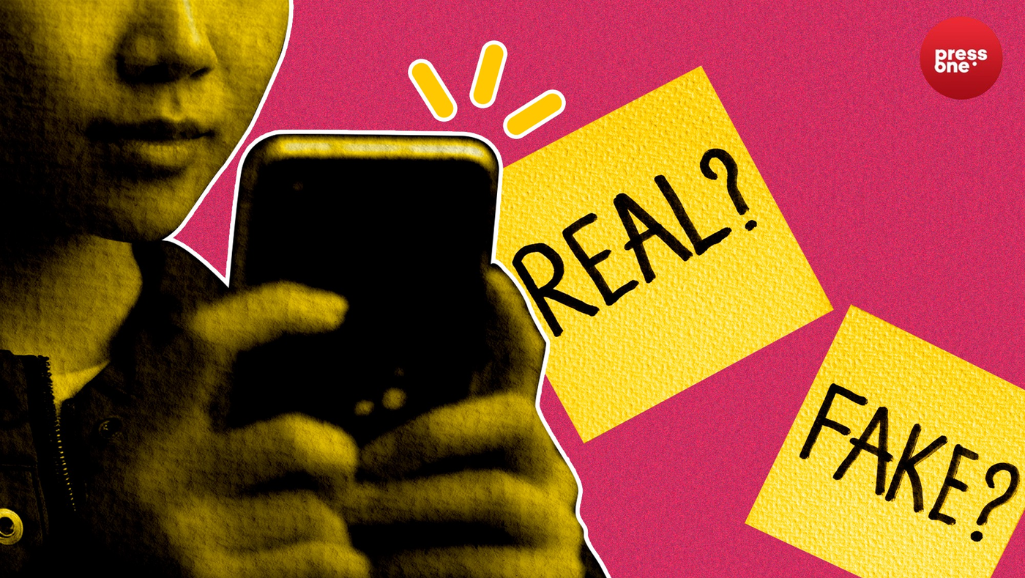
Under the bill, SIM card subscribers will be required to register their SIM cards along with any government-issued identification document. However, the bill does not state that it will directly give the government access to subscriber data.

Claim: The government will have direct access to subscriber data under the SIM Card Registration Bill.
Rating: FALSE
Kabataan Partylist Rep. Raoul Manuel claimed that the government will have direct access to subscriber data under the SIM Card Registration Bill.
Manuel is a Filipino youth activist and politician with over 16,500 followers on Twitter. As of writing, his post has received more than 1,000 retweets, nearly 300 quote tweets and more than 6,000 likes.
He tweeted the following last Sept. 5, the same day the bill was approved at the committee level: “Ready na ba kayo na isuko sa gobyerno ang details and transactions na connected sa SIM card ninyo?”
Ready na ba kayo na isuko sa gobyerno ang details and transactions na connected sa SIM card ninyo? ????????????
House committee on info and comms technology approves SIM Card Registration Bill.
I was the lone dissenter. ✊
— Raoul Manuel #Kabataan (@iamRaoulManuel) September 5, 2022
Manuel’s claim, however, is false.
In an explanatory note, the authors of House Bill 14 (the Subscriber Identity Module [SIM] Card Registration Act), Speaker Martin Romualdez, Alexander “Sandro” Marcos, Yedda Marie Romualdez, and Jude Acidre, wrote that the purpose of the bill was to lessen and prevent criminal activities aided by unregistered mobile SIM cards.
“The increase in connectivity through affordable SIM Cards and mobile phones has made government service delivery more efficient and possible in the far-flung areas of the country. However, we are also conscious of the fact that the accessibility of SIM Cards has encouraged unscrupulous actors to take advantage and use this in the commission of criminal acts,” Acidre said.
Under the provisions of the proposed SIM Card Registration Act, every public telecommunications entity (PTE) or authorized seller must require their end-users or subscribers to accomplish and sign a control-numbered registration form issued by the PTE.
The registration will require the subscriber’s name, date of birth, gender, and address as appearing in a valid ID with a photo, and the assigned mobile number and serial number.
The bill did not provide for direct government access to subscriber data.
In fact, it has a confidentiality clause that states: “Any information in the SIM card registration shall be treated as absolutely confidential, unless access to information has been granted upon written consent of the subscriber.”
The bill does not state that a subscriber would give up one’s details and transactions to the government once the SIM is registered.
Manuel did mention the risks posed by the fragile cybersecurity system of the Philippines.
“The mobile numbers are under the control of service providers, and given that we don’t have a strong cyber security mechanism in place, our data could be used by those people who have our information. There could be a leak,” Manuel was quoted by GMA News and One News as saying.
Manuel said he would submit a dissenting opinion to the committee report and elaborate his position in plenary deliberations. – Jessie Rival
This fact-check was produced by PressOne.PH as part of a fact-checking grant from the Philippine Fact-Checker Incubator (PFCI) Project. The PFCI supports news organizations to allow them to meet global fact-checking standards under the International Fact-Checking Network’s Code of Principles.
PressOne.PH believes that fact-checking is essential to combating misinformation and disinformation, and in informing and educating citizens and voters. Read more of PressOne.PH’s Fact-Checking Policy by clicking here.
The public is welcome to send feedback or requests for fact-checks at factcheck@pressone.ph.


FACT-CHECK: Actress’ photo used in false comparison of Filipina life before, during colonialism
The photo in question is that of the actress Ayen Munji-Laurel, who portrayed the role of ‘Hara Lingayan’ in the primetime historical fiction ‘Amaya’ that aired from 2011 to 2012 on the GMA Network.

FACT-CHECK: Hoax messages raise false alarm over exposure to ‘cosmic rays’
Hoax messages claiming that harmful cosmic rays were set to pass close to earth have circulated anew, coinciding with a rare total solar eclipse in North America on April 8, 2024.

FACT-CHECK: 10 mga post online na maaaring pinaniniwalaan ng mga bata
Alam naman nating lahat kung gaano kalaki ngayon ang problema natin sa paglaganap ng mali-maling impormasyon, lalo na sa social media. Sa pakikipagtulungan ng PressOnePH at ng RedBin Philippines, ito ang aming pag-fact check sa mga claims na pinaniniwalaan ng ilang mga bata online.